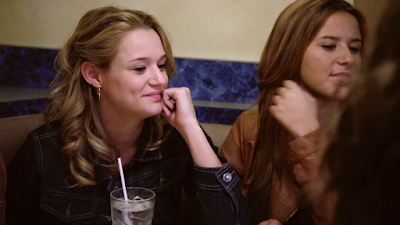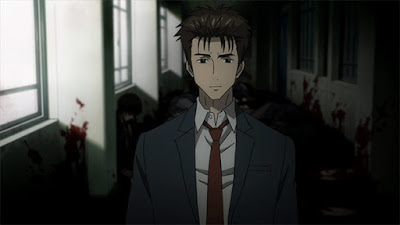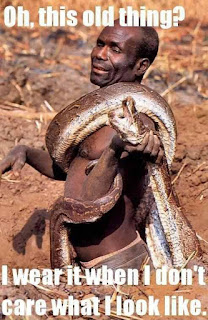I didn't sleep much a few nights ago, so I thought I'd make the most of my time and watch the remainder of Season 4 of
Orange is the New Black. The first half is, frankly, meh, although the show does pick itself up as it goes on, and I'd say that this season more than any before it really puts its cast through the wringer. I can't imagine how much money they must have spent on pale foundation and that fake sweat stuff they use to make people look clammy, but it must have made some make-up supplier very happy.
 |
| As well as whomever handles the royalty payouts for Oz. Jus sayin' |
I don't want to talk about the plot or the characters or this that and the next thing that everyone else will likely drone on about. OITNB is not as good as it was, but it'll get you from 2 to 6am without a second thought, so it's still got that going for it, and that's where my critique stops. What I'd like to talk about is our good friend, foreshadowing. You might be more familiar with it by it's pet-name: the Indiana Jones "I told you not to trust anyone" effect. If you ever spot something in a film or TV show that seems like it's oddly specifically placed or phrased, likelihood is that it's the filmmakers trying to make some sort of subtle nod. Sometimes its an in joke or a reference, but often it hints at future revelations in the movie. For a good example of
really fucking obvious foreshadowing, watch
Fight Club.
 |
| "A movie about Edward Norton repeatedly punching himself" must have been the easiest sell ever. |
OITNB's newest season is all about rug pulls; playing the storytelling long con, if you will. Much of the plot elements introduced in the first episodes aren't developed fully until the closing few, which lends a great deal to the great overarching tensions that pervade the season. OK, this is where we'll be getting spoilery, so stop, collaborate and Netflix if you would rather experience the show's twists
al dente from this point on. Right at the start of the season we're introduced to a swathe of new characters who all serve to unsettle the already choppy waters the inmates were left in after season 3, of particular note being a bunch of new security guards, both maximum security officers and army veterans.
 |
| And, it appears, the Jigsaw Killer. |
Their captain, one Piscatella, encourages unorthodox and often barbaric tactics that gradually turn the inmates against the guards, eventually resulting in a plot to overthrow him. The plan for a peaceful protest ends in the sudden, unfair murder of the innocent Poussey (insert joke about murdering some Poussay here, cause I ain't doin it). Warden Caputo attempts to defend the actions of the guard responsible for Poussey's death, and as a result, incites a full scale riot, on the climax of which the season ends like the massive emotional blue ball that it is.
Yes, this is likely mainly a
Games of Thrones "kill a popular character out of nowhere" trick to attempt to seal the deal on season 5, but much of the latter episodes of season 4 are actually a rather liberal re-imagining of Shakespeare's
Julius Caesar, if you can believe it. It's a complicated play, and liberties are taken, but short story: a group of people plot to kill Julius Caesar before he has the chance to take the throne as emperor; they succeed, however are eventually turned upon by the populace and driven out by a mob who, in their furore, accidentally kill an innocent bystander; then murder, suicide, suicide (cause this is Shakespeare, people), exeunt. No, the stories aren't by any stretch of the imagination identical, most notably differing in that the plot fails in OITNB and focus is shifted to the death of the innocent, but a great deal of similarities do exist between Shakespeare and Season four of OITNB.
 |
| The constant, unsettling presence of Brian Blessed notwithstanding. |
It all really kicks off in episode 12, where we have the plan to remove the man of military experience, Piscetella, from power:
 |
| "So what, we do a dance number or some shit?" |
This plot culminates in (skipping the death of Caesar) the murder of a bystander, thought to be one of the conspirators or, in OITNB's case, mistaken for an attacker:
 |
| Spoiler Warning: Kaiser Sose is actually Kevin Spacey. |
Caputo is essentially playing Mark Antony here, initially attempting to support the inmates and punish those responsible for Poussay's death (which has now replaced that of Caesar's, just to confuse things), but then going on to defend the guard who killed her under the belief that he was acting appropriately; for "the good of Rome" if you will:
 |
| "I am not good at picking sides." |
Then, slightly out of order, there finishes with a riot, incited by the words of our Mark Antony, albeit the...wrong ones, but damnit this is definitely intentional! The closing episodes of this season are a retelling of
Julius Caesar. And I'll darned well prove it! Here's a shot of Poussey talking to Judy King in the library in episode 8.
 |
| Lookit dat smile. |
And here's the shot immediately after the last one. Poussay has put a book on the shelf, and look what it happens to be...
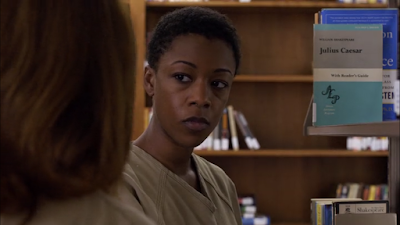 |
| Them evils tho. |
That sure is an oddly perfectly framed place to put
Julius Caesar, no matter what ordering system you might be using. Just so you know, the OITNB library uses Dewey Decimal:
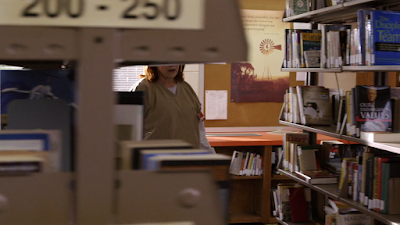 |
| I have too much spare time on my hands at the moment. |
Julius Caesar (822.3) and
Prescription for Excellence (658.812) are both in completely the wrong place in this library, so either Poussay is really bad at her job, the set designer is a hack, or there's a reason for all this. OK, I don't actually think there's much to
Prescription for Excellence, aside from maybe alluding to the poor organisation of Litchfield and its sudden decline into a money-oriented business rather than, you know, a prison. But
Caesar? It's like Prop Choice 101 to never make a character handle Shakespeare unless you plan to have them die, go mad, or go mad then die. Even if you're not personally aware of the story comparisons, seeing a character so blatantly display a work by literature's greatest mass murderer is one hell of a red flag for shit about to go down. I hereby declare, for the sake of all fictional characters everywhere, that Shakespeare may never be handed by another living soul while in front of a camera ever again.
 |
Gene Wilder even weaponized Shakespeare by quoting it on 5 separate occasions
and irreversibly ruining the lives of as many families. |
















